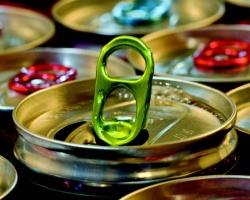Do Bullies Bully Because They Like It?
We’ve heard kids become bullies for a variety of reasons. Maybe they’re having trouble at home; maybe they’ve been bullied themselves. A group of researchers say some bullies may hurt others for a much simpler reason: They like bullying.
Scientists recently examined the brainwaves of a few bullies as part of a psychological study, published in Biological Psychology. The researchers expected to find that when bullies witnessed scenes of someone in pain, their brainwaves would stay pretty constant—a sign of indifference that, in theory, would allow them to steal someone’s milk money without feeling bad about it.
Instead, bullies seemed actually to get pleasure from watching pain: Pleasure-sensing areas of their brains would light up. “If that is true, they are getting positively reinforced every time they bully and are aggressive to other people,” said Dr. Benjamin Lahey of the University of Chicago. (National Geographic)
Warning Consumers About Caffeine
Believing too much caffeine is dangerous for youth, 100 scientists are asking the Food and Drug Administration to regulate the booming energy drink industry a bit more.
The cadre of scientists sent a letter to the FDA, asking it to require energy drink makers to list their products’ caffeine content. The issue, these scientists say, is that caffeine content varies widely from product to product: While Red Bull, the nation’s top-selling energy drink, contains about 80 milligrams of caffeine per 8-ounce can (about the same as a cup of coffee), some others contain many times that.
“You can pick up a can and drink it and get 50 milligrams, which is the amount in a Mountain Dew,” says Roland Griffiths, who wrote the letter, “or pick up one and get 500 milligrams, and that’s enough to put someone who hasn’t built up a tolerance to caffeine into caffeine intoxication, resulting in nervousness, anxiety, restlessness, insomnia, nausea, vomiting, tremors and rapid heart rate.” Youth, scientists believe, are particularly at risk. (USA Today)
Therapy, Drug Helps Stressed-Out Kids
The antidepressant serotonin eases anxiety disorders in children; three months of therapy helps even more; but a new study suggests the best remedy may be using both at the same time.
Experts estimate that as much as 20 percent of kids in the U.S. are affected by some sort of anxiety disorder. In the study, 81 percent of children who received the drug and therapy reported feeling much better, compared to 60 percent who received just therapy and 55 percent who got just the drug. Although serotonin has been linked with rare suicidal behavior in depressed children, very few anxiety-stricken kids reported suicidal thoughts; and there were no suicide attempts during the study. (Associated Press)
Give Those Kids More Ds!
The American Academy of Pediatrics is recommending that children get more vitamin D—twice as much as is currently recommended—because they believe the vitamin could help prevent kids from contracting serious diseases.
The academy recommends children get 400 units of vitamin D daily. Babies who drink formula or kids who drink a lot of milk (about four cups every day) are getting all they need, doctors suggest breast-fed babies and most children get some supplemental vitamin D somewhere. (Associated Press)
Dangerous Sports
Most high-school sports, by nature, can be dangerous. Some, according to researcher Frederick O. Mueller of the University of North Carolina, are more dangerous than others. Football, according to Mueller, causes more injuries nationwide than any other sport—probably not all that surprising. There have been more than 600 catastrophic injuries in the sport since 1982, when Mueller started his research. More than 100 of them were fatal.
When it comes to rates of injury, football lags behind two other, less popular high school sports: gymnastics and ice hockey. Ice hockey is particularly dangerous for female participants, who are three times more likely to get injured than their male counterparts.
Why is hockey so dangerous? Mueller says it’s all about the environment in which the respective sports are played.
“In football, they’re landing on a relatively soft surface compared to ice hockey,” he says. (ABC News)
Burger King Cuts Down on Salt
Burger King announced recently that it’s limiting sodium in its kids meals to 600 milligrams or less. The first meal to meet the company’s new criteria? Kraft Macaroni and Cheese, Fresh Apple Fries with low-fat caramel dipping sauce and 1 percent low-fat milk, for a grand total of 340 calories and 505 milligrams of sodium. Other meals will be rolled out shortly, according to Burger King Chairman and CEO John Chidsey.
“We are proud to be the first quick-service restaurant to publicly commit to limiting sodium in kids meals,” he says. (Reuters)




